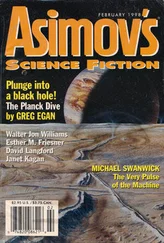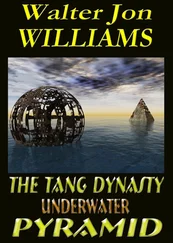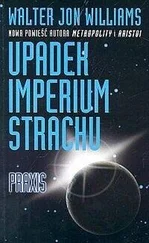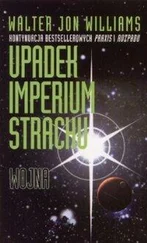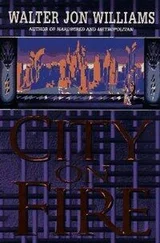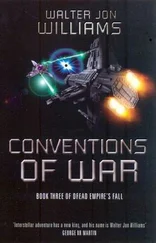Martinez panned the camera after them and found them halted about fifteen paces in front ofCorona’s airlock. Their chameleon-weave jackets were already flashing red patterns, and frustration gnawed at Martinez at his inability to read what the Naxids were saying.
Then he remembered that an imperfect Fleet translation program existed for the Naxid pattern language, and that it was probably installed onCorona’s computers. He triggered the Record button, figuring he’d try to read the conversation later, and zoomed in closely enough so he could see the sleeve badges on the group of warrant officers who hovered respectfully behind their seniors.
He saw weaponer patches. Engineers. And Military Constabulary, though without the usual red belts and armbands they wore on duty.
Why those three? Martinez supposed that weaponers and engineers might assist with inspections of weapons bays and engine rooms, but he’d never known them to be a part of any such inspection. And in any case, why were constables in the mix?
The Naxids swept on to thePerigee in the downspin berth and went through the same routine. Martinez kept the camera on them, kept recording the red patterned flashes. And then he wondered,What elseare the Naxids doing?
He could access most of the military station’s security cameras from his own station, and he began throwing them up on other displays.
Other Naxid patrols were moving along the ring, demonstrating the same sort of behavior they’d shown alongCorona’s stretch of dockyard. The Terran light squadron had its own set of visitors, and the heavy division crewed by Daimong.
There was no unusual activity near the berths occupied by the two Naxid divisions. The only dockyards visited by the Naxids were those occupied by the three non-Naxid divisions, those labeled “Mutineers” during the recent exercises.
Weaponers, he thought. Engineers. And the constabulary.
If you were to take a ship by boarding, he thought, the first thing you’d want to secure would be the missiles with their lethal antimatter warheads, and you’d need weaponers for that. Engineers would be required to secure the engines, which used dangerous antimatter as fuel and whose blazing torch could itself be used as a weapon. Officers would be needed in Command and Auxiliary Command. And armed military cops would make the whole job all that much easier.
A warning bell began to chime in Martinez’s thoughts. He zoomed the security cameras in on the Naxid parties and began to record the feed.
Then he started to dig through menus for the program that would translate the Naxid flash patterns.
He discovered that the bead patterns didn’t translate well. The patterns had evolved in order to help packs of Naxids chase down prey on the dry veldt of their home continent, and they tended to be idiomatic and strongly dependent on context. There were, for instance, about twenty-five ways to flashyes, depending on the situation and who was being addressed, and the patterns could mean anything from a simple affirmative to “this unworthy one is staggered by the percipience of Your Excellency’s reasoning.”
There was a rigid pattern of symbols, with unambiguous meanings, that were to be used in military situations where absolute clarity was required, but the Naxids weren’t using these. They seemed to be having the equivalent of an informal, slangy conversation, which Martinez thought suspicious since there were both officers and enlisted in the group. The Naxids were instinctively submissive to pack leaders, who in turn behaved with a highly formalized arrogance to underlings: he couldn’t imagine the Naxid superiors using this kind of informal language to their subordinates.
The only reason Martinez could think of for the idiomatic quality of the flash-dialogue was that the Naxids were striving to make their silent conversation as incomprehensible as possible to outsiders.
Nevertheless, some of it translated. Repeated more than once was a pattern that meant either “distant coordinates,” or “dusty ground,” or “target”—Martinez was betting on “target.” Other patterns were less ambiguous: “move swiftly,” “make secure,” and “swarm,”which the program explained was a hunting tactic designed to bring down a large prey animal. There were a number of patterns along the lines of “Your lordship shall be obeyed without question,” and “this unworthy one marvels at the dimensions of your”—something that was either “hindquarters,” or “gemel tree,” neither of which seemed suitable to the occasion.
There were other references, to “cold ocean” and “divan chamber,” phrases that were sufficiently idiomatic that the translation program declined to attempt to assign them meaning. The program declined even to guess at the rest.
Martinez followed the Naxid parties with the security cameras until their mission was completed. The enlisted returned to their individual ships, but the officers went toMajesty of the Praxis, Fleet Commander Fanaghee’s flagship, presumably to report.
Martinez thought for a long, somber moment as he stared at the multiple displays, then saved all the recordings and the translations into his personal file. He wiped the screens, thought for another moment, and triggered his sleeve display.
“Contact Alikhan,” he said.
Alikhan answered the call within a few seconds. “My lord.”
“Meet me in Auxiliary Command at once.”
Alikhan betrayed no hint of surprise at this unusual order. “Very good, my lord.”
Martinez rose from his seat and glanced around Command. Cadet Vonderheydte was at the position that monitored ship’s systems, bent over a display and probably censoring mail. Signaler/Second Blanchard, in Martinez’s own division, daydreamed over the communications board. Otherwise Command was empty.
“Vonderheydte,” Martinez said.
The small, yellow-haired cadet shook himself and straightened at his station. “Lord Lieutenant.”
“The watch is yours till I return.”
“The watch is mine, my lord.”
Martinez pushed his displays up until they clicked into place and stepped out of the locked command cage. He made his way to the exit and then hesitated—Vonderheydte had kept watches before, but usually he or Koslowski had backed him up with an experienced warrant officer.
“Vonderheydte,” Martinez said.
“My lord?”
“Contact me in Auxiliary Command in case of anything unusual or important. Particularly if anyone requests permission to come aboard.”
The cadet blinked in surprise. “Very good, my lord.”
Martinez went down the central belt elevator to Auxiliary Command, the armored battle station aft intended for use if Command was destroyed by an enemy or in the hands of mutineers. He paused outside the hatch, then stepped to one side to check the six long, low rooms referred to officially as “biological recreation chambers.” None of the crew were having a romp at present, which was not surprising, considering that the crew remaining onCorona were employed in polishing everything to a golden gleam, something guaranteed to make Martinez less than beloved among the pulpies if they ever discovered that it was his idea.
He waited for Alikhan’s arrival, then opened Auxiliary Command with his lieutenant’s key. The armored door rolled shut behind them as the lights automatically came on.
Auxiliary Command was smaller than Command, the stations more cramped and the gimbaled chairs placed closer together. Nevertheless, the metal cages gleamed, and the scent of polish wafted on the breeze: the place had been carefully sleekened and burnished just that morning.
“I’d like your opinion, Alikhan,” Martinez said as he squeezed between two of the cages to sit in one of the couches at the communications station. “Sit on my right here, watch some video, and tell me what you think.”
Читать дальше

